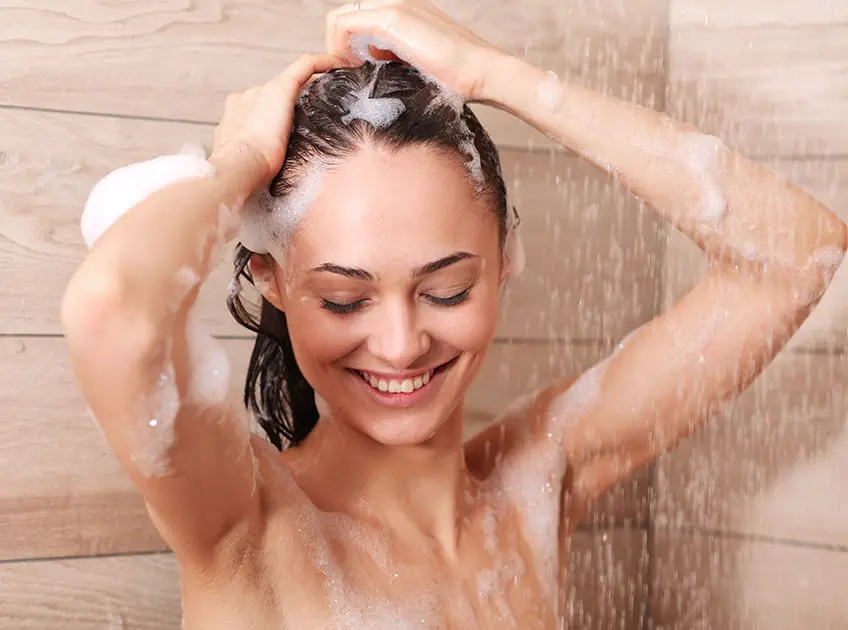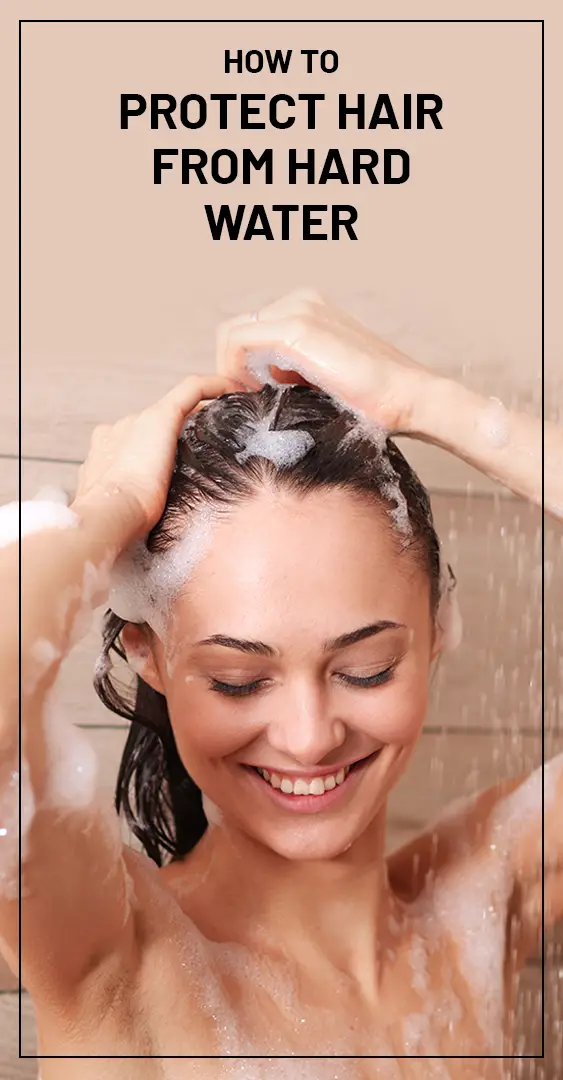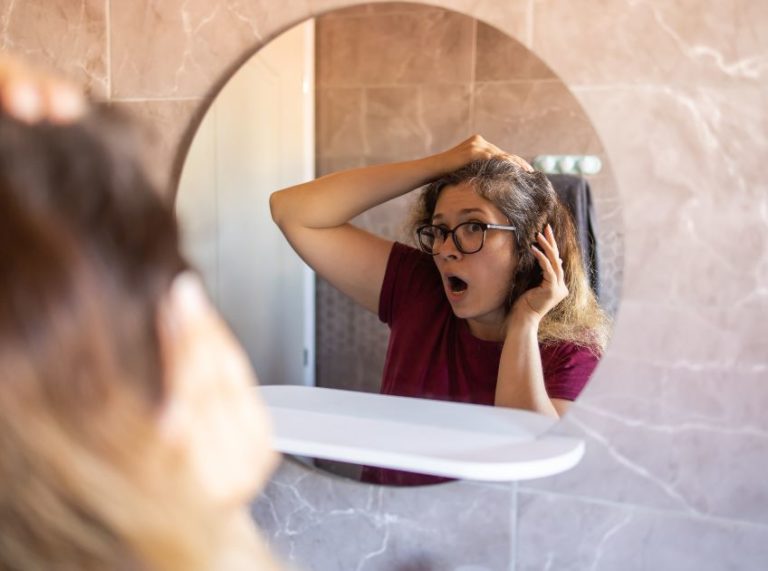
Important: This article is for informational purposes only. Please read our full disclaimer for more details.
As we all know that hard water is very hard on the hair surface. It is excess in dissolved minerals, especially magnesium and calcium. When clear rainwater is filtered via soil, sand, and rocks and it naturally observes the mineral salts such as magnesium and calcium. Hard water develops limescale in sinks, faucets, and bathtubs.
Effects of Hard Water on Hair

Hard water minerals do not bind to shampoos, soaps, and conditioners thus decreasing efficiency and increasing usability. After washing several times, the minerals solvate in the hard water forms a film on the hair, blocking moisture from entering the hair. The result is dullness, dryness, frizziness, scaly, splits ends, breakage, thin hair, and dull-colored hair.
Hard water can cause dandruff and itching on the scalp. Hard water minerals combine with shampoo to create salt. It lets a residue on the surface of the scalp and hair. It prevents hair moisturizers, keeps hair dry, and is prone to breakage. If the hair breakage continues, it leads to creating a thinning hair appearance.
7 Simple Ways to Protect Hair from Hard Water
There are lots of ways are available for you to take care of your hair which gives you greater results. Some of the significant tips are given below.
1. Fix Water Filters on Shower Head
This type of filter is easily available at the nearest supermarkets. It is very simple to install on the shower head. Shower head filters perfectly decrease the huge level of choline and minerals in your water. It provides support to hair to decrease hard water damage. It significantly diminishes the limescale and other sorts of chemicals in the hard water, as well as provides, helps to soften the water level.
[ Recommended: How to Do Deep Condition Your Hair at Home ]
2. Usage of Clarifying Shampoos
This is the other best way to remove scalp and hair dirt. Clarifying shampoo helps to clean the scalp deeply and take away the scalp’s residue as well as retain the hair shiny. If you feel your hair is heavy, dusty, oily, and itchy, you can move to clarify shampoo and use it once a week. As per research reports, clarifying shampoo has all-natural ingredients that remove hair-damaging contents like harsh chemicals, minerals, and alcohol from the hair surface.
3. Usage of Citrus Rinse
Citric acids such as lime or lemon juice are an excellent solution to neutralize the effects of hard water on the hair. Lemon juice has antiseptic properties that reduce mineral buildup and improve hair shine as well as protect hair from dandruff formation.
Combine a 3 tbsp of citrus juice or vinegar along with three cups of bottled water. Make it as a solution and apply to the hair and let it for five minutes and wash it off properly.
[ Recommended: How To Keep Your Hair Healthy and Strong ]
4. Usage of Moisturizing Conditioner

Usage of moisturizing conditioner at least once a week, assists to prevent hair from dryness and minimize damage to the follicles. Regular usage of natural ingredients like argan oil, coconut oil, almond oil, and jojoba oil help to keep the natural moisture on the scalp as well as give soft and glossy hair.
5. Usage of Hair Mask
The hair mask is also one of the best solutions to maintain healthy hair and reduce hard water damage.
Mix one ripped banana along with ½ cup of yogurt and blend it like a paste then add 1 tbsp of coconut oil and mix it well. Apply the mixture directly to the scalp and let it for 2 hours and wash it with a mild shampoo.
Usage of a hair mask once a week, provides nourishment to the scalp and hair roots as well as restores glossy shine and moisturized hair.
6. A Final Rinse with Purified Bottled Water
Although we don’t motivate the use of plastic water bottles that are dangerous to the environment, many people have chosen the final rinse of filtered water to reduce the impact of hard water. If you follow this option, take a larger bottle and refill it with purified water and use it for the final rinse before leaving the shower.
7. Apple Cider Vinegar Rinse
Apple cider vinegar is most powerful compared to other vinegar. ACV provides help to safeguard the hair and scalp from hard water damage.
Combine 1 cup ACV along with 2 cups of water. Apply this mixture to the hair scalp and massage gently. Let it for 5 minutes and then wash it off.
ACV acids help to remove the calcium formation from your hair and regulate the scalp pH level and also maintain silky and soft hair. At the time of hair washing in hard water, ACV neutralizes calcium formation. You can pour this mixture into a spray bottle and include lavender oil and coconut oil which provide an opulent treatment.
Apply this mixture to the scalp and hair roots, massage it well and wait for 15 minutes. Finally, you can rinse your hair with purified water, otherwise, you will face the effects of vinegar.
The above points are a temporary solution. In addition, you must use them regularly to experience long-term effects. When saving money on conditioners, shampoos, and styling products, the water softener is a long-lasting solution. Water softeners remove the calcium and magnesium in your home water supply and give you soft water, turning your dull, dry hair into soft, manageable, and keep healthy. soft water needs less soap, which means you can use less water, and spend less on shampoos, detergents, and soaps.
Recommended Topics:
- Why Should You Go For Antifungal Shampoo
- How to Strengthen Hair Naturally
- How To Protect Your Hair From Sun
- Essential Nutrients For Healthy Hair Growth
















